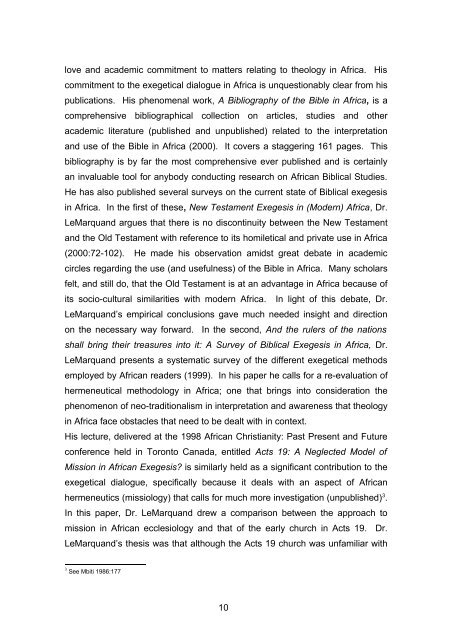African Hermeneutics: The Current State - Theology In Africa
African Hermeneutics: The Current State - Theology In Africa
African Hermeneutics: The Current State - Theology In Africa
Create successful ePaper yourself
Turn your PDF publications into a flip-book with our unique Google optimized e-Paper software.
love and academic commitment to matters relating to theology in <strong>Africa</strong>. His<br />
commitment to the exegetical dialogue in <strong>Africa</strong> is unquestionably clear from his<br />
publications. His phenomenal work, A Bibliography of the Bible in <strong>Africa</strong>, is a<br />
comprehensive bibliographical collection on articles, studies and other<br />
academic literature (published and unpublished) related to the interpretation<br />
and use of the Bible in <strong>Africa</strong> (2000). It covers a staggering 161 pages. This<br />
bibliography is by far the most comprehensive ever published and is certainly<br />
an invaluable tool for anybody conducting research on <strong><strong>Africa</strong>n</strong> Biblical Studies.<br />
He has also published several surveys on the current state of Biblical exegesis<br />
in <strong>Africa</strong>. <strong>In</strong> the first of these, New Testament Exegesis in (Modern) <strong>Africa</strong>, Dr.<br />
LeMarquand argues that there is no discontinuity between the New Testament<br />
and the Old Testament with reference to its homiletical and private use in <strong>Africa</strong><br />
(2000:72-102). He made his observation amidst great debate in academic<br />
circles regarding the use (and usefulness) of the Bible in <strong>Africa</strong>. Many scholars<br />
felt, and still do, that the Old Testament is at an advantage in <strong>Africa</strong> because of<br />
its socio-cultural similarities with modern <strong>Africa</strong>. <strong>In</strong> light of this debate, Dr.<br />
LeMarquand’s empirical conclusions gave much needed insight and direction<br />
on the necessary way forward. <strong>In</strong> the second, And the rulers of the nations<br />
shall bring their treasures into it: A Survey of Biblical Exegesis in <strong>Africa</strong>, Dr.<br />
LeMarquand presents a systematic survey of the different exegetical methods<br />
employed by <strong><strong>Africa</strong>n</strong> readers (1999). <strong>In</strong> his paper he calls for a re-evaluation of<br />
hermeneutical methodology in <strong>Africa</strong>; one that brings into consideration the<br />
phenomenon of neo-traditionalism in interpretation and awareness that theology<br />
in <strong>Africa</strong> face obstacles that need to be dealt with in context.<br />
His lecture, delivered at the 1998 <strong><strong>Africa</strong>n</strong> Christianity: Past Present and Future<br />
conference held in Toronto Canada, entitled Acts 19: A Neglected Model of<br />
Mission in <strong><strong>Africa</strong>n</strong> Exegesis? is similarly held as a significant contribution to the<br />
exegetical dialogue, specifically because it deals with an aspect of <strong><strong>Africa</strong>n</strong><br />
hermeneutics (missiology) that calls for much more investigation (unpublished) 3 .<br />
<strong>In</strong> this paper, Dr. LeMarquand drew a comparison between the approach to<br />
mission in <strong><strong>Africa</strong>n</strong> ecclesiology and that of the early church in Acts 19. Dr.<br />
LeMarquand’s thesis was that although the Acts 19 church was unfamiliar with<br />
3 See Mbiti 1986:177<br />
10


